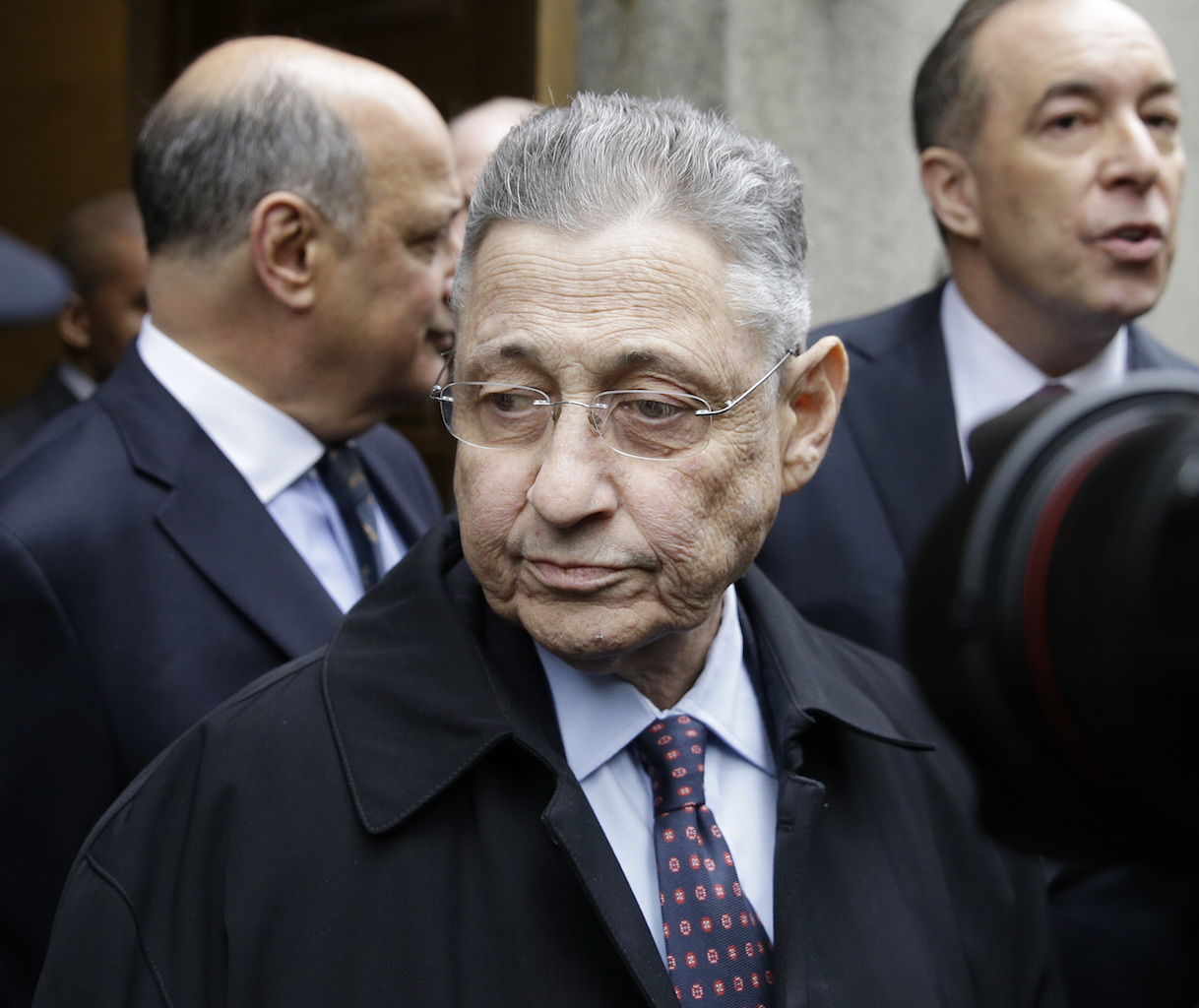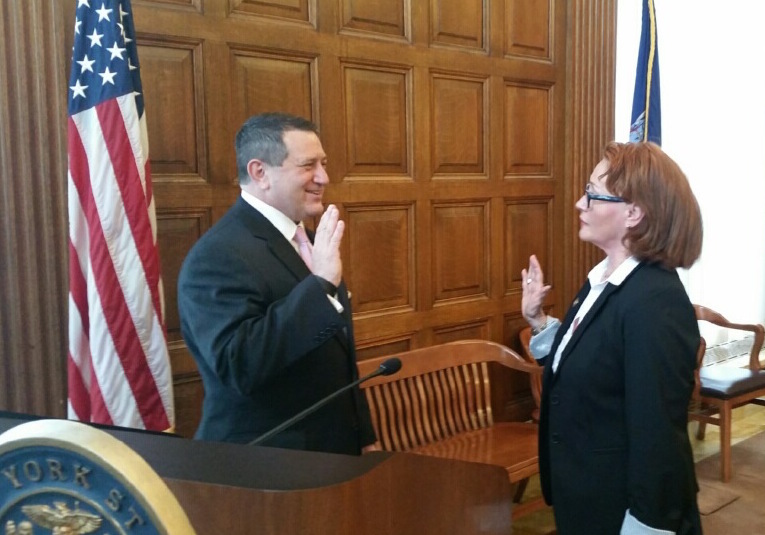
BY MARY REINHOLZ AND LINCOLN ANDERSON | Former state Assembly Speaker Sheldon Silver, once one of New York’s most powerful politicians and a lifelong resident of the Lower East Side, was sentenced by a federal judge on Tuesday to 12 years in prison for his conviction last November on seven counts of corruption, including extortion, honest services fraud and money laundering.
He had been found guilty after a five-week jury trial of abusing his public office to provide preferential treatment to a cancer researcher at Columbia University and two real estate developers. In turn, they provided lucrative referrals to two Manhattan law firms that had retained Silver as a part-time attorney since around 2000. Silver was found guilty of raking in $5 million in kickbacks through the two schemes.
The judge, Valerie E. Caproni, who imposed the hefty sentence, acknowledged some of Silver’s good deeds to his constituents in the 65th Assembly District, among them his advocacy for tenants and help for reeling residents after 9/11 and Superstorm Sandy.
But Caproni also characterized the 72-year-old Democrat as a corrupt and “scheming politician” who was simply trying to hang on to power. She ordered Silver to turn himself in to authorities by noon July 1, stating her intent was to strike fear into the hearts of other politicians who might succumb to corruption by the prospect that “they could spend their golden years in an orange jumpsuit.”
No one else was indicted in the case. Dr. Robert Taub, who received $500,000 in state grants that Silver funneled to the doctor’s mesothelioma research center in return for referrals, served as a witness for the prosecution.
The media swarmed the fallen pol as he exited the court via Pearl St.
“He’s trying to get out the back way!” somebody shouted from deep within the pack of frenzied news hounds. They had been waiting for Silver at the main entrance of the courthouse on 40 Centre St., some laughing as they lunged toward the gray-haired man with a stricken look who had just received what could be a life sentence.
A few of them climbed over parked vehicles to hurl questions at Silver such as, “How do you feel now?” and “What are you are going to say to your wife tonight?”
The last was a reference to recent claims by the government that Silver was also a philandering husband to his wife, Rosa, of nearly 50 years. Rosa attended the sentencing but did not leave with him. Silver has been accused of engaging in affairs with two women for whom he got jobs, a charge Silver’s defense team claims is false and salacious.
“They’re like piranha,” a passerby murmured with amazement, after catching a glimpse of Silver enveloped by the stampeding media mob. A couple of husky security guards helped Silver get into a waiting yellow cab. Before taking off, he responded to one of his interrogators who wanted to know what his plans were.
“I believe in the justice system, and we’ll see whatever remedies the system makes available,” he said, his voice faltering a bit. But the words were clear.
Then he was gone, free on bail, after reportedly having arrived at the courthouse by an M20 bus.
Silver’s defense team stood nearby, answering questions, including one from The Villager to attorney Steven Molo. Would the defense team appeal Silver’s sentence?
“Yes,” he replied, adding that the defense had informed Caproni of the appeal before the sentencing.
How come there were no co-defendants on trial with Silver?
Molo smiled a trifle sardonically.
“You’ll have to ask the U.S. attorney about that,” he said, referring to Preet Bharara of the Southern District. Bharara has already sent at least a dozen politicians to jail or to different careers in his crusade to clean up what he calls New York’s “show me the money” culture.
Left-wing comic and activist Randy Credico also stood outside the courthouse after attending Silver’s sentencing. He described Caproni’s ruling as “very unfair” and denounced Bharara as a “sadistic narcissist,” looking for headlines.
“Why doesn’t he go after somebody like Senator Chuck Schumer, who has made millions off of Wall Street?” he asked.
Credico said he has known Silver for years and credited him with helping his campaign to reform the old draconian Rockefeller drug laws.
“I gave him one of my buttons,” Credico said.
Bharara had initially asked the judge to sentence Silver to more than 14 years, considerably less time for six of the charges against him that carry a maximum penalty of 20 years each. Silver’s sentence is two years less than what former Brooklyn Assemblymember William Boyland, Jr. got last year in a corruption case.
Silver’s attorneys called on Caproni to temper justice with mercy, noting their client has battled with prostate cancer, now in remission, and spent nearly 40 years trying to assist people in crisis on the Lower East Side.
“He has helped people and tried to lift them up during dire times,” said attorney Joel Cohen, who asked for a sentence of community service with little or no incarceration.
Cohen noted some 100 letters sent to the judge requesting leniency for Silver. Several were from high-profile New Yorkers, like former Mayor David Dinkins and Randi Weingarten, president of the 1.6 million-member American Federation of Teachers of the AFL-CIO, attesting to his character and commitment to progressive causes. But it was to no avail.
Just before she gave him 12 years behind bars, Caproni told Silver sternly: “I hope the sentence I impose on you will make the next politician hesitate before he accepts a kickback or bribe.”
Bharara, who sat in on the sentencing in a back-row seat, his stern gaze sweeping the courtroom, later issued a statement, saying: “Today’s swift sentence is a just and fitting end to Sheldon Silver’s long career of corruption.”
Silver, however, may wind up doing no time at all should the U.S. Supreme Court overturn the conviction of former Governor Robert McDonnell of Virginia, who was convicted with his wife, Maureen, on corruption charges in 2014. The eight justices seem sympathetic to McDonnell’s case, reported the Washington Post on April 28, noting they were concerned about federal corruption laws criminalizing behavior that’s considered “everyday or routine” for politicians who perform services for benefactors.
“For better or for worse, [this] puts at risk behavior that is common,” said Justice Stephen G. Breyer, who along with Chief Justice John G. Roberts, Jr. suggested that the federal corruption laws are so vague that they might be unconstitutional.
Similarly, The Villager asked Bharara when he was the keynote speaker at the New York Press Association’s recent spring convention, if “the bar had been lowered” to convict Silver. No, Bharara said firmly, explaining that the case against Silver was solid and extensive.
A verdict in the Virginia case could come at the end of June, shortly before the date when Silver is scheduled to begin his sentence. If it’s favorable for the McDonnells, Silver’s attorneys could negotiate a deal to keep him out of prison, said Gerald Lefcourt, a prominent Manhattan criminal defense lawyer who has represented Yippie leader Abbie Hoffman and several convicted New York politicians.
“What is a quid pro quo? It’s so vague and the [laws] give so much power to the prosecution,” Lefcourt said in a telephone interview. “How do you know the difference between what’s politics as usual and what’s criminal? It’s a slippery slope.”
He noted that Dr. Taub said in Silver’s case that he did not consider their dealings to be a quid pro quo situation.
Even if Silver stays out of his prison, his reputation is in ruins, destroyed by a media that “tarred and feathered” him during his prosecution, said Democratic strategist Hank Sheinkopf. He compared the “bloodletting” against pols like Silver to the Tammany Hall era of Mayor Jimmy Walker and, more recently, to that of former Mayor Ed Koch, when a prosecutor named Rudolph Giuliani rose to prominence by sparking the city’s Parking Violations Bureau scandal in the 1980s. It led to the suicide of Queens Borough President Donald Manes.
“Prosecutors need something to do and there is corruption out there and headlines to be made. But these scandals don’t make New York look good,” Sheinkopf said, adding they also might be a deterrent to young people deciding on careers in politics under constant scrutiny. “Politics isn’t noble anymore,” he said.

Even so, there seems to be no shortage of people vying for Silver’s former Assembly seat. Alice Cancel was elected to fill out Silver’s term in an April 19 special election, beating three other candidates running on various other party lines. About a half-dozen candidates now hope to challenge her in the September open Democratic primary.
Cancel was sworn into the Assembly on Monday by Majority Leader Joseph Morelle. She will also have another swearing-in back in the district this Friday.
“This is a sad day for the [Silver] family and a sad day for our community,” Cancel told The Villager after Silver’s sentencing. “Our community needs time to heal. I’m here to serve the community as I was elected to do.”
Her husband, Democratic State Committeeman John Quinn, shot down rumors that Cancel would not be running for re-election in September, and said she clearly has strong support in the community.
“Alice was sick for a while and her diabetes is now under control,” he said. “Her election against an extremely well-funded opponent [Yuh-Line Niou] was truly the voice of our community being heard. She didn’t even do a mailing. Yet the people knew her work.”
Two candidates who plan to run in the September primary quickly blasted out e-mail statements after the sentencing. And, unlike Silver’s die-hard supporters and political allies, they weren’t blaming prosecutors for being overzealous.
“Today, the era of Sheldon Silver is over,” District Leader Paul Newell said. “While this is a sad day for Lower Manhattan and a sad day for New York, it also presents an opportunity for change. Now the real work of ending Albany’s culture of corruption can begin. Our goal should be not to purge a few bad actors, but to end it — for good.
“Political graft like that which Silver was convicted of is not just a personal failure,” Newell said. “It impoverishes us all. The costs of corruption are higher rents, higher taxes, underfunded schools and crumbling subways.
“In Lower Manhattan and across New York State, people are ready for a new kind of leadership. Our neighborhoods need real infrastructure investment, stronger tenant protections, more and better schools and an honest voice in Albany.”
Niou, who came in a close second in the special election for the 65th A.D. seat last month, while running on the Working Families Party line, similarly vigorously supported Tuesday’s outcome.
“Today’s sentencing of former Speaker Silver to 12 years in prison and over $6 million in restitution is an appropriate punishment that sends a clear message to Albany that the culture of corruption that continues to fester in our state government must end,” she said. “Mr. Silver’s crime and corruption permanently harmed our community, and we may never know the full extent of the damage that he caused to New York’s rent laws while on the take of developers and landlords.
“With this sentencing,” Niou said, “I hope Albany will find the integrity and political will to finally strip pensions from corrupt officials and clean up our broken ethics and campaign finance laws to give the taxpayers of our great state the honest government they deserve.”
Another candidate for the 65th A.D. seat in September, District Leader Jenifer Rajkumar, said she would work to replace a Tammany Hall-style “culture of corruption with a culture of service,” and would also act as a full-time legislator if she gets the job.
West Village District Leader Arthur Schwartz, who is running for Assembly against incumbent Deborah Glick in the West Village and Lower West Side’s 66th Assembly District, wrote a letter to the judge calling for her to give Silver the maximum on all seven counts he was convicted on.
He also urged her to strip Silver of his $79,000 annual pension.
“To do less,” Schwartz said, “would be to allow him to benefit, while in prison, from the position of trust which he took unconscionable advantage of.”
Glick, who worked closely with Silver over the years, did not respond to e-mail requests for comment. A spokesperson later said she was “unavailable.” But Glick, who is a full-time legislator — never having had an outside job beyond her Albany post — previously has defended her relationship with the fallen pol, saying, “I wouldn’t run from the fact that Shelly did a lot of good things over the years.” She noted that he stopped the West Side stadium, supported expanding pre-K and always fought for education, among other things.
“People are not one-dimensional,” she said. “I think Shelly did lots of things, and I think the things that were raised during the trial were obviously deeply disturbing.”
Another staunch Silver ally over the years, Assemblymember Richard Gott-fried, said, “The convictions of former Assembly Speaker Sheldon Silver, former state Senate Majority Leader Dean Skelos and other public officials in recent years are disheartening. While most people in public service would never abuse their official position for personal gain, no one is above the law. I believe it’s clear that we should end outside income for legislators.”




























